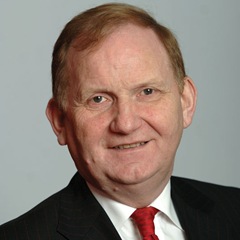Laying down the law
 Justice Committee Chair Lord Morrow takes a firm line on law and order as he discusses his personal views and the committee’s work with Peter Cheney.
Justice Committee Chair Lord Morrow takes a firm line on law and order as he discusses his personal views and the committee’s work with Peter Cheney.
“You couldn’t possibly have lived in Northern Ireland for the last 40 years and not have had even a fleeting interest in justice or in law and order issues,” Lord Morrow remarks.
Fermanagh and South Tyrone’s experience of the Troubles means that justice, policing and security have been major political issues for him for a long time, although he always felt he was “on the other side when decisions were made” by the Northern Ireland Office.
He opposed “about 99 per cent” of those decisions: “I always had the feeling within me that it had more to do with political expediency than it had to do with justice and the rule of law.”
The devolution of justice, though, places former hunger-striker Raymond McCartney alongside him as the committee’s Deputy Chairman.
“It’s extremely tough,” Morrow comments on sitting with McCartney. While the UK Government insists on Sinn Féin being in government and on the Justice Committee, he adds that if he had had his way, “that wouldn’t have been the case.” Relations within the committee, he comments, are “business-like”.
For Morrow, law and order are the central issues for society and he thinks that Sinn Féin could also be “more vocal” in supporting the police.
“I think that if we are going to move forward in this country, we’re going to have to move forward on the basis of a firm and respected law and order policy. If we do not get the community behind that, we’re going to have great difficulties ahead.”
The new Department of Justice made up the bulk of the NIO, which was often seen as inflexible under direct rule. The department and committee have “cordial enough” relations and he pledges that a good working relationship will continue.
“I’m not there to put my arms around the Minister and say: ‘Aren’t you doing a wonderful job?’ Nor am I there to just slate him,” he continues. “My role is simply to hold the Minister to account, and his department.”
A good justice system, in his view, is “fair and transparent” and has the confidence of the whole community, with the exception of paramilitaries. He calls on the Justice Minister to give “firm leadership” and show a “no-nonsense attitude and approach” towards those who break the law.
“I think there has to be a general respect within the community, within the Assembly here, for policing and justice,” he emphasises. “And if we achieve that, then we’re doing something. And if we don’t, then it means we have to work harder.”
He is concerned that the PSNI is facing the dissident threat with half the size of the RUC and, speaking from his party’s viewpoint, opposes 50:50 recruitment and the phasing out of the full-time reserve. He wants the 50:50 policy to be abolished now that police recruitment has been frozen.
In summary, he considers human responsibility to be vital and thinks that the human rights of the offender have been “overplayed to the detriment of people standing up and being made responsible, held to account, for their deeds.”
Work plan
The committee is already working its way through the full range of issues on its agenda.
The Justice Bill is expected to take up a huge amount of committee time, given the wide range of policy changes which it will contain. Sentencing for rioting is one area which Morrow will watch carefully, especially as he considers local policy to be lighter than in England and Wales.
Over there, a conviction for rioting can lead to up to 10 years in prison. This is for large disturbances, involving 12 or more people.
A Northern Ireland court can impose any penalty, up to life imprisonment, for the common law offence of riot, the Department of Justice confirmed. However, a minimum custodial sentence of two years is also available in law. Riotous behaviour, which is more common, has a maximum penalty of 12 months.
“Having said that, we do not want a Justice Bill that is purely a ‘pluck-out’ of England and Wales and brought over here,” he continues, “but I think there are some things that might be unique to Northern Ireland that would have to fit in with our situation [i.e. the threat of terrorism].”
Accompanying David Ford’s prisons review, announced when he first met the committee, its members have visited Maghaberry prison. He won’t rule out other prison visits. The review will look at conditions of detention, management and oversight in all prisons; the first part is considering that prison after highly critical inspection reports.
Similarly, the committee has agreed to consider mental health in prisons in detail. Morrow comments that some prisoners with those problems should be in hospital instead. About 70 per cent of prisoners have some degree of mental illness.
Speaking personally, he is “deeply unhappy” with the negotiated settlement in August which ended a protest by Maghaberry’s dissident republican prisoners.
“I see it more as capitulation to the prisoners’ demands and I can’t think of one demand that the prisoners have asked for that they haven’t got,” he comments, adding that prisons should be run by the governor and his staff, not the inmates.
In January this year, the Irish News quoted Morrow as saying: “There will be no devolution of policing and justice during the lifetime of this Assembly.” It is put to him that he must be surprised to be in this position now, and he agrees.
“When I said that, I did think that that the Government were not sincere in ensuring that there was going to be the necessary resources in place to ensure that we could have effective policing here in Northern Ireland.”
Morrow credits Peter Robinson for the package’s subsequent increase from
£400 million to £800 million.
With finances now tighter, the Justice Committee will be watching the budget “very, very carefully in the future to ensure that there’s always going to be enough resources to make Northern Ireland as safe a place as is possible to be, and that our Police Service will be provided with the resources that they need.”
‘Full role’ for security services
Morrow does not see an overlap between peerage and his role as committee chair but his seat in the Lords allows him to follow the wider debate on the UK’s national security.
“It’s a useful position to have,” he says. “And it’s one that I will be looking forward to even more in the future, now that we have got policing and justice devolved but national security is not. And rightly so, it’s not.”
MI5 assumed responsibility for intelligence-gathering here in October 2007. It receives support from Government Communications Headquarters (GCHQ) and, in the Republic and overseas, from MI6.
He supports the intelligence services having a full role in every part of the UK, including Northern Ireland, which puts him at odds with Margaret Ritchie’s call for the PSNI to take on MI5’s role.
“It won’t matter much what Margaret Ritchie or indeed what Maurice Morrow either thinks about it, because that will go ahead,” he concludes.






